七年级英语下册第四单元第四课时导学案
【范文】七年级下册英语第四单元表格式导学案

七年级下册英语第四单元表格式导学案本资料为woRD文档,请点击下载地址下载全文下载地址www.5y 3a—Selfcheck周次总课时数授课时间课型New教学目标知识与技能:1、复习谈论规章制度。
2、复习使用must,haveto,can和can’t。
3、通过自主学习和训练建立本单元的知识框架。
过程与方法:任务教学法讨论法听说法情感态度价值观:了解西方孩子有烦恼时,更愿意向专业人士或机构求助。
重点难点复习谈论规章制度。
复习使用must,haveto,can和can’t。
教学手段多媒体,录音机教学程序教学内容个性设计预习I、预习交流.根据音标拼读单词并牢记;2.自学课文,勾画出重点和疑惑。
3.完成第24页3a,3b和Selfcheck。
II、翻译官.keepmyhairshort2.relaxonweekends_____3.learntoplaythepiano_________4.readabook________________5.havefun___________________6.在家____________________教师寄语:Habitisasecondnature.习惯成自然。
这节课,让我们一起列出本单元的知识树,掌握这些知识要点吧!你准备好了吗?Let’sgo!知识与技能:1、复习谈论规章制度。
2复习使用must,haveto,can和can’t。
3、通过自主学习和训练建立本单元的知识框架。
过程与方法:任务教学法讨论法听说法情感态度价值观:了解西方孩子有烦恼时,更愿意向专业人士或机构求助。
I、新课呈现Step1FreetalkTalkabouttheruleswehaveathomeandinourschool.Step2PresentationReviewwordsandphrases.Reviewsomesentencepatterns.Reviewhowtowriterules.Step3PracticeFinish3a.checktheanswers.Finish1,2inSelfcheck.checktheanswers.Step4Pairworkworkinpairsandfinish3c.writedowntherules.listeningII、合作交流Groupwork:讨论如何写信谈论身边的规章制度并写下来。
新人教版英语七年级下册导学案(全册)

新人教版英语七年级下册导学案(全册)
目标
本导学案旨在帮助学生全面复和巩固新人教版英语七年级下册的内容,提高他们的英语听说读写能力。
内容
本导学案共包含七年级下册的所有单元,每个单元的内容安排如下:
1. 单元名称: [单元名]
- 词汇: [重点词汇]
- 语法: [重点语法]
- 阅读: [阅读内容]
- 听力: [听力练]
2. ...
使用方法
1. 学生按照导学案的顺序逐个研究每个单元。
2. 针对每个单元,学生应当掌握重点词汇、重点语法,并进行阅读和听力练。
3. 学生可以按照自己的节奏进行研究,但建议每天保持一定的研究时间。
4. 完成每个单元后,学生可以进行相应的练和测试来巩固所学知识。
注意事项
1. 学生在研究过程中应保持积极的研究态度,养成良好的研究惯。
2. 学生可以在遇到困难时向老师或同学寻求帮助,但要保持独立思考和自主研究的能力。
3. 学生应合理安排研究时间,不要过度依赖导学案,应主动参与课堂和其他研究活动。
结束语
通过按照导学案进行有序的学习和复习,相信学生可以全面提升自己的英语水平,更好地应对七年级下册的学习任务。
希望学生们能够充分利用这份导学案,取得优异的成绩!加油!。
人教版七年级英语下册导学案 Unit4 Don’t eat in class. (2)
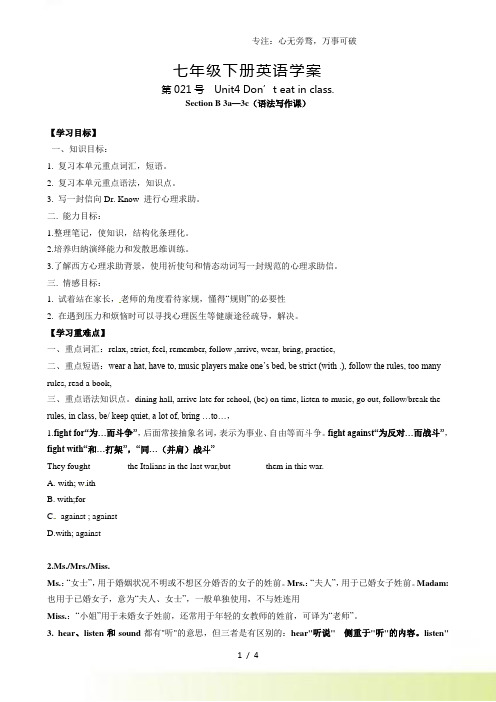
七年级下册英语学案第021号Unit4 Don’t eat in class.Section B 3a—3c(语法写作课)【学习目标】一、知识目标:1. 复习本单元重点词汇,短语。
2. 复习本单元重点语法,知识点。
3. 写一封信向Dr. Know 进行心理求助。
二. 能力目标:1.整理笔记,使知识,结构化条理化。
2.培养归纳演绎能力和发散思维训练。
3.了解西方心理求助背景,使用祈使句和情态动词写一封规范的心理求助信。
三. 情感目标:1. 试着站在家长,老师的角度看待家规,懂得“规则”的必要性2. 在遇到压力和烦恼时可以寻找心理医生等健康途径疏导,解决。
【学习重难点】一、重点词汇:relax, strict, feel, remember, follow ,arrive, wear, bring, practice,二、重点短语:wear a hat, have to, music players make one’s bed, be strict (with .), follow the rules, too many rules, read a book,三、重点语法知识点。
dining hall, arrive late for school, (be) on time, listen to music, go out, follow/break the rules, in class, be/ keep quiet, a lot of, bring …to…,1.fight for“为…而斗争”,后面常接抽象名词,表示为事业、自由等而斗争。
fight against“为反对…而战斗”,fight with“和…打架”,“同…(并肩)战斗”They fought ________the Italians in the last war,but________them in this war.A.with; w ithB. with;forC.against ; againstD.with; against2.Ms./Mrs./Miss.Ms.:“女士”,用于婚姻状况不明或不想区分婚否的女子的姓前。
鲁教版七年级下册英语全册导学案含答案
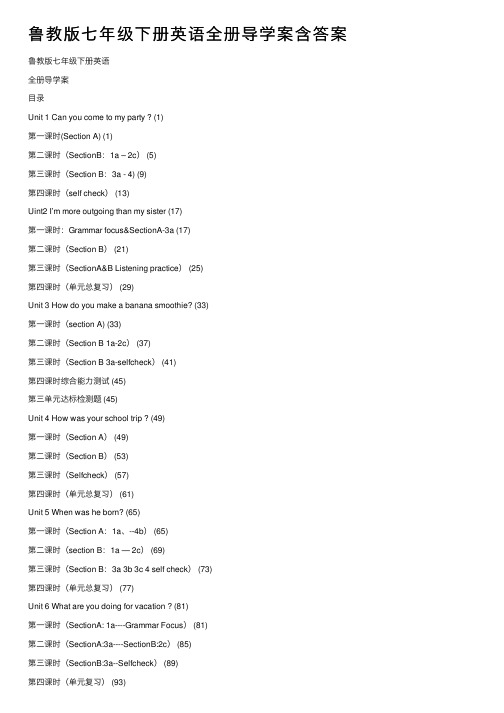
鲁教版七年级下册英语全册导学案含答案鲁教版七年级下册英语全册导学案⽬录Unit 1 Can you come to my party ? (1)第⼀课时(Section A) (1)第⼆课时(SectionB:1a – 2c) (5)第三课时(Section B:3a - 4) (9)第四课时(self check) (13)Uint2 I’m more outgoing than my sister (17)第⼀课时:Grammar focus&SectionA-3a (17)第⼆课时(Section B) (21)第三课时(SectionA&B Listening practice) (25)第四课时(单元总复习) (29)Unit 3 How do you make a banana smoothie? (33)第⼀课时(section A) (33)第⼆课时(Section B 1a-2c) (37)第三课时(Section B 3a-selfcheck) (41)第四课时综合能⼒测试 (45)第三单元达标检测题 (45)Unit 4 How was your school trip ? (49)第⼀课时(Section A) (49)第⼆课时(Section B) (53)第三课时(Selfcheck) (57)第四课时(单元总复习) (61)Unit 5 When was he born? (65)第⼀课时(Section A:1a、--4b) (65)第⼆课时(section B:1a — 2c) (69)第三课时(Section B:3a 3b 3c 4 self check) (73)第四课时(单元总复习) (77)Unit 6 What are you doing for vacation ? (81)第⼀课时(SectionA: 1a----Grammar Focus) (81)第⼆课时(SectionA:3a----SectionB:2c) (85)第三课时(SectionB:3a--Selfcheck) (89)第四课时(单元复习) (93)Unit 7 I’ m going to be a basketball player. (97)第⼀课时(1a----Grammar Focus) (97)第⼆课时Section A3a- SectionB 2c) (101)第三课时(SetionB3a—self-check) (105)第四课时(检测你雄厚的综合实⼒吧!) (109)Unit8 Could you please clean your room? (113)第⼀课时Section A (1a----Grammar Focus) (113)第⼆课时(3a----2c) (117)第三课时(3a-self-check) (121)第四课时 (125)Unit 9 What’s the best radio station? (129)第⼀课时(section A 1a-2c) (129)第⼆课时(section A 3a - self check) (133)第三课时(单元复习) (137)Unit 10 It’s a nice day ,isn’t it ? (141)第⼀课时(Section A:1a---4) (141)第⼆课时(Section B:1a--- 4) (145)第三课时单元复习 (149)Unit 1 答案 (153)unit2参考答案 (155)Unit3 参考答案 (157)单元达标检测题 (158)Unit 4 参考答案 (160)Unit 5参考答案 (163)unit6 答案 (165)unit7 参考答案 (166)Unit 8参考答案 (167)Unit 9 参考答案 (171)Unit10参考答案 (172)Unit 1 Can you come to my party ?亲爱的同学们,你曾参加或举⾏过聚会吗? 欢迎你⾛进Unit 1 , 相信你会成为风度翩翩的绅⼠或举⽌⽂雅得体的⼥⼠的!第⼀课时 (Section A)当你被别⼈邀请时,你都会做到恰如其分、彬彬有礼吗?相信你没问题!学法导引:学会情态动词can 的⼀般疑问句式及其肯定回答和否定回答。
七年级下册英语:Unit4 4-2导学案

时课型课题Unit4第2课新授编号4-2This is a gr eat school,bu t there are a lot of rules.Can we bring music players t o school?And we always have t o wear the school uniform.学科英语班级七年级领导签字执笔人使用人使用时间1、学习掌握本节课的生词和短语;2、巩固祈使句的用法;学习目标3、学习情态动词can表示许可的肯定句、否定句、一般疑问句及肯定、否定回答。
4、提高学生的听说能力。
学习重学习情态动词can表示许可的肯定句、否定句、一般疑问句及肯定、点、难点否定回答。
课时安排1课时自主预习翻译1.eat outside________________2.wear a hat___________________3.a lot of___________________4.be late for class_______________5.不得不__________________6.穿校服_____________________7.保持安静________________展示交流S tep1RevisionReview the school rules at P19.S tep2PresentationPresent key sentences in this period.And we also have t o be quiet in the library.S tep3ListeningListen and finish2a and2b.Check the answers.S tep4Pair workT alk a bo u t the rules in2a.S tep5Role-playRole-play the conversation in2d.知识探究动词ca n的用法(1)表示能力,"会""能"I can dance and sing.我能唱歌又能跳舞。
七年级英语下册第四单元Unit 4 导学案

Unit 4 Don't eat in class 第1课时section A 1a—1c学习目标掌握10个单词:rule arrive be on time hallway hall dining listen listen to fight sorry2、掌握并灵活运用句型:What are the rules? Don’t do sth. We can (not) do sth3、能应用所学知识进口语交际学习重点:能应用所学知识进口语交际学习难点:能掌握祈使句的否定句形式学法指导:自主学习交流合作听力训练对话操练学习过程:任务一:自我预习:根据音标读出1a---1c的单词熟读1a 的词组并翻译成汉语。
1. Don’t arrive late for class.2. Don’t run in the hallway.3. Don’t eat in the classroom.4. Don’t listen to music in the classroom or the hallway.5. Don’t fight.fight的用法:1)v. 打架,争吵。
构成词组:①fight for….②fight against….③fight with….2)n. 打架:have a fight 打架。
任务二完成1a1、谈论图片,说出他们在干吗?A: What are they doing? B: They’re fighting.A: What is she doing? B: She is . A: What is he doing? B: He is .2、完成任务(将校规的数字写在学生的旁边)任务三听录音完成1b听力任务1、1b是关于的对话,熟读该对话找出表示规则的用语。
2、比较Don't arrive late for class.和We can't arrive late for class. 的异同。
第四课时新目标七年级下导学案
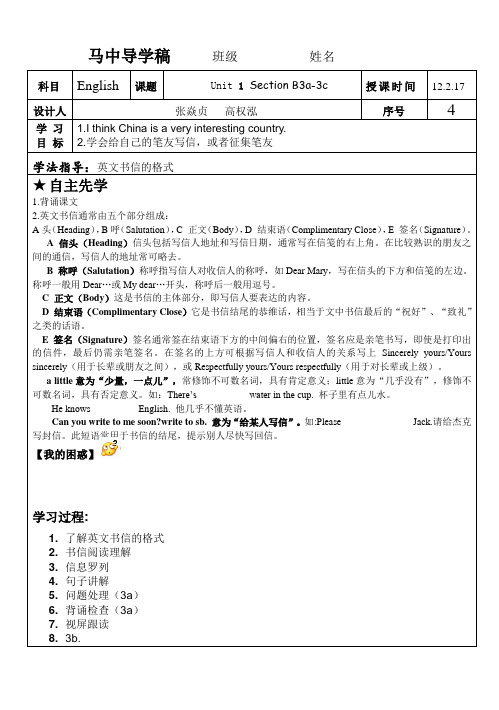
马中导学稿班级______姓名____________
科目
English
课题
Unit1Section B3a-3c
授课时间
12.2.17
设计人
张焱贞高权泓
序号
inais a very interesting country.
2.学会给自己的笔友写信,或者征集笔友
学法指导:英文书信的格式
盘点收获
课后巩固
1、背诵(3a)
2、写作
★自主先学
1.背诵课文
2.英文书信通常由五个部分组成:
A头(Heading),B呼(Salutation),C正文(Body),D结束语(Complimentary Close),E签名(Signature)。
A信头(Heading)信头包括写信人地址和写信日期,通常写在信笺的右上角。在比较熟识的朋友之间的通信,写信人的地址常可略去。
【我的困惑】
学习过程:
1.了解英文书信的格式
2.书信阅读理解
3.信息罗列
4.句子讲解
5.问题处理(3a)
6.背诵检查(3a)
7.视屏跟读
8.3b.
当堂检测
巩固练习(3c)
Fill in the passage according to yourself.
My partner’s name is __________.His/Hernew pen pal’s name is __________.He/Sheis _______ years old.He/Sheis from __________.Helives in ___________.At school,helikes ______________.Hisfavorite___________ is _______I thinkhecan be my partner’s pen pal. Do you think so?
人教新目标版英语七年级下册《What time do you go to school》导学案4

What time do you go to school一.预习目标:知识与能力1. 识记一些重要词汇: up,get up,dress,get dressed,brush,Tooth(teeth),shower, take a shower, usually, forty2.理解并掌握下列句型:1.A:What time do you get up?B:I usually get up at six thirty.二、预习重点:熟练掌握What time……引导的句型。
三、预习难点:Listening practice and make up new conversations.四、预习任务:(一)预习内容:任务一:写出下列单词或短语。
1.向上________________2.起床,站起________________________3.穿衣服____________________4.穿上衣服________________________________5.刷,刷净____________(复数_________________)6.牙齿_______________(复数)______________7.淋浴______________8.通常地_________________9.洗淋浴________________________________10.四十___________________________________11.去上学_______________________________12.刷牙____________________________________ 13.吃早饭_______________________________13.在六点半________________________________任务二:想一想,这些句子该如何表达?1.你几点起床? ___________________________________________________?我在六点起床。
七年级英语下册导学案(全册)

七年级英语下册Unit 1 Where is your pen pal from?四环一主导学1 Section A 1a--Grammar focus【学习目标】1.学会一些国家和城市的英文名称,:会用所学知识,询问和回答人们来自哪里。
2.学会理解和尊重异国文化.【学法指导】1、联系生活学习英语。
敢于用英语表达,用英语进行交际。
2、听力策略:A. 放松心情。
B. 注意关键字【课前准备】准备一张世界地图.自主学习指导1.自主学习第1-2页的生词,根据音标会读知意.2.朗读第1-2页的句型,能英汉互译.3.你知道这些国家和地区的英文名称吗?(1)中国_______(2) 加拿大________ (3)法国________(4)英国_________ (5)澳大利亚______(6) 美国_______(7)新加坡______ (8)悉尼________(9) 巴黎_______(10)纽约________(11)多伦多_______(12)东京_________1.你二.课堂互动探究1. 小组活动:1) 共同总结本节课的重点单词及短语,然后互相提问。
2)讨论:中国、日本、美国、加拿大、澳大利亚、英国、法国、新加坡等的国家名称、首都等形式,并展开小组竞赛,看看那组最棒。
3) 讨论:询问某人来自哪里,用句型_________________________。
回答时,用__________________________________。
4)了解be from 与come from区别。
5)live后何时用in,何时不用in。
整理到笔记本上。
三.知识精讲点拨:1)Where is/are + 主语+ from ?这一特殊疑问句用来询问某人来自哪里,回答时,用主语+is/are +from+地点。
eg:Where are you from? I’m from Chaohu. Where is he from? He’sfrom Hefei.拓展:be from = come from be是系动词,come 是实义动词eg: Where does he come from? He comes from Hefei.2)live 不及物动词,意思是“居住”不能直接加地点,需要有介词.eg: ----- Where does she live? ------She lives in Paris.3)pen pal =pen friend 笔友4)China 中国Chinese 中国人Japan 日本Japanese 日本人eg:We are all Chinese. The three girl are Australians.四.有效训练(一.)单项选择She is from ______.A .Japan B.Japanese C.Chinese D. .Japans2.Where do they ______?A.live inB.liveC.livesD.to live3._______do you come from?A.WhatB.WhereC.WhichD.Why4.-----Where is your friend from? ---------He _______France.e fromB. .comes fromC.go fromD.goes from5.Where is Sydney?___________A. JapanB. CanadaC. the United StatesD. Australia二、句型转换。
人教版七年级英语Unit4Don't eat in class整单元导学案

七年级英语导学案班级:姓名:学习内容:Unit 6 I’m watching TV.Section A (1a-2d)学习目标:1) 能掌握以下单词:newspaper, use, soup, wash, movie, just能掌握以下句型:①—What are you doing? —I'm watching TV.②—What's he doing? —He's using the computer.③—What are they doing? —They're listening to a CD.④—This is Jenny. —It's Laura here.2) 能掌握语法:现在进行时态的用法。
3) 能运用所学的知识,描述人们正在干的事情。
I.Self--study—学有准备,轻松在课堂(一)重点词汇:看电视______________ 读报纸______________ 通过电话交谈______________做鸡蛋汤_____________洗碗碟______________ 锻炼_____________________(二)找出以下重点句:①—Do you want to join me for dinner?②—Let’s meet at my home first.③—That sounds good.(三)听力:听录音,完成1b、2a、2b,并且核对答案。
(四)阅读2d,找出重点内容,用红笔做记号。
1. This is Jenny. 我是詹妮。
这是打电话用语。
当打电话时,介绍自己时用“This is…”或“It’s…”;问对方用“Is that…?”或“Who’s that?”例如:Hello? This is Bob? Who’s that?喂?我是鲍勃,你是谁?Hi, Bob. It’s Mike here.你好,鲍勃。
我是迈克。
七年级英语下册导学案(全套)
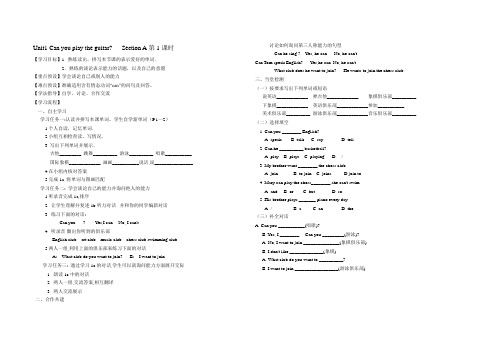
Unit1 Can you play the guitar? Section A第1课时【学习目标】1. 熟练读出,拼写本节课的表示爱好的单词.2.熟练的谈论表示能力的话题,以及自己的意愿【重点预设】学会谈论自己或别人的能力.【难点预设】准确适用含有情态动词“can”的问句及回答。
【学法指导】自学、讨论、合作交流【学习流程】一、自主学习学习任务一:认读并拼写本课单词。
学生自学新单词(P.1—2)1.个人自读,记忆单词.2.小组互相检查读、写情况.3 .写出下列单词并展示.吉他_________ 跳舞__________ 游泳__________ 唱歌___________国际象棋_____________ 画画___________说话,说________________4.在小组内核对答案.5.完成1a 将单词与图画匹配.学习任务二: 学会谈论自己的能力并询问他人的能力.1.听录音完成1a,排序2. 让学生理解并复述1b听力对话. 并和你的同学编新对话.3. 练习下面的对话:Can you ----? Yes,I can. No, I can't. .4. 听录音.圈出你听到的俱乐部English club art club music club chess club swimming club5.两人一组,利用上面的俱乐部来练习下面的对话.A: What club do you want to join? B: I want to join ---- 学习任务三: 通过学习1c的对话,学生可以就询问能力方面展开交际1. 朗读1c中的对话2. 两人一组,交流答案,相互翻译3. 两人交流展示.二、合作共建讨论如何询问第三人称能力的句型Can he sing ? Yes, he can . No, he can't.Can Tom speak English? Yes,he can. No, he can't.What club does he want to join? He wants to join the chess club.三、当堂检测(一)按要求写出下列单词或短语说英语_____________ 弹吉他_____________ 象棋俱乐部__________ 下象棋_____________ 英语俱乐部_____________参加___________美术俱乐部__________ 游泳俱乐部_____________音乐俱乐部__________ (二)选择填空1. Can you ________ English?A. speakB. talkC. sayD. tell2. Can he __________ basketball?A. playB. playsC. playingD. /3. My brother want ________ the chess club.A. joinB. to joinC. joinsD.join to4. Mary can play the chess________ she can't swim.A. andB. orC. butD. so5. His brother plays _______ piano every day.A. /B. aC. anD. the(三)补全对话A. Can you ___________(唱歌)?B. Yes, I ________. Can you _________(游泳)?A. No, I want to join _______________(象棋俱乐部).B. I don't like ______________(象棋)A. What club do you want to __________?B. I want to join __________________(游泳俱乐部)Unit1 Can you play the guitar? Section A第2课时【学习目标】.掌握并运用各种俱乐部的短语。
最新】人教版七年级英语下册Unit4全单元4课时导学案

最新】人教版七年级英语下册Unit4全单元4课时导学案段落开始:Unit 4 Don't Eat in ClassIn this unit。
we will learn how to use negative ___ by using "Don't" + the base form of the verb。
For example。
"Don't eat in class." We will also learn some school rules and practice using these words in ___.One ___ to note is that negative imperatives are often used in written language to express ___。
in spoken language。
we can use modal verbs such as "can" or "must" to soften the tone and make the same message ___.Let's discuss the rules we have ___。
We can also work in groups to create class or group rules and come to a consensus on what they should be.By the end of this lesson。
we should have a better understanding of how to use negative imperatives and modal verbs in English。
as well as an ___.Unit 4 Don't Eat in ClassIn the first lesson's homework。
【七年级】新目标七年级英语下册Unit4 导学案
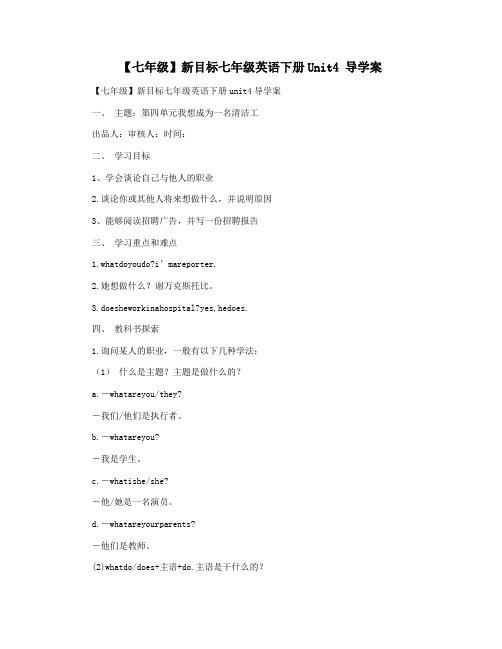
【七年级】新目标七年级英语下册Unit4 导学案【七年级】新目标七年级英语下册unit4导学案一、主题:第四单元我想成为一名清洁工出品人:审核人:时间:二、学习目标1、学会谈论自己与他人的职业2.谈论你或其他人将来想做什么,并说明原因3、能够阅读招聘广告,并写一份招聘报告三、学习重点和难点1.whatdoyoudo?i’mareporter.2.她想做什么?谢万克斯托比。
3.doesheworkinahospital?yes,hedoes.四、教科书探索1.询问某人的职业,一般有以下几种学法:(1)什么是主题?主题是做什么的?a.―whatareyou/they?―我们/他们是执行者。
b.―whatareyou?―我是学生。
c.―whatishe/she?―他/她是一名演员。
d.―whatareyourparents?―他们是教师。
(2)whatdo/does+主语+do.主语是干什么的?a、―你在做什么?你是做什么的?―iamastudent.我是一名学生b、―她/她/你父亲/你母亲是做什么的?―he/sheisabankclerk.(3)受试者的工作是什么?某人的职业是什么?a.―what’syourjob?―我是学生。
b.―what’slilei’sjob?李磊的职业是什么?―海萨报告员。
他是一名记者。
c.―what’syourmother’s/father’sjob?―他/她是助理。
(4)whatdo/does+主语+wanttobe?主语想要成为……?―你想成为什么样的人?―iwanttobeapoliceman.2.专业名词的构词法(1)+er职业egclean(打扫)→cleaner(清洁工)唱→ 歌手报道→ 维波特wast(等待)→waiterwork(工作)→worker(工人)教师→ 教师→ 农场→ 农民(2)动词+oreg:act(表演)→actor(演员)visit(参观)→visitor(3)音乐-音乐家(4)名词+man+womaneg:post(有地,寄送)→pestman(邮递员)3.① 警察男警察复数:警察②plicewomann女警察复数:policewomen警察抓小偷。
【人教版】七年级下册英语:Unit4 4-4导学案
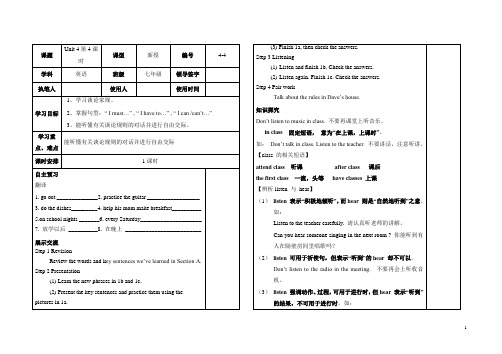
展示交流
Step1 Revision
Review the words and key sentences we’ve learned in Section A.
Step2 Presentation
(1) Learn the new phrases in 1b and 1c.
Listen to the teacher carefully.请认真听老师的讲解。
Can you hear someone singing in the next room ?你能听到有人在隔壁房间里唱歌吗?
(2)listen可用于祈使句,但表示“听到”的hear却不可以。
Don’t listen to the radio in the meeting.不要再会上听收音机。
(2)Listen again. Finish 1c. Check the answers.
Step4 Pair work
Talk about the rules in Dave’s house.
知识探究
Don’t listen to music in class.不要再课堂上听音乐。
in class固定短语,意为“在上课,上课时”。
(3)listen强调动作、过程,可用于进行时,但hear表示“听到”的结果,不可用于进行时。如:
Be quiet, please! I’m listening to the music.请安静,我在听音乐。
巩固提升
()1. Gina often helps her mother ________the dishes.
A. on B. in C. before
Unit 4(第4课时 Section B 1a-2b)(导学案)-七年级英语上册(人教版)
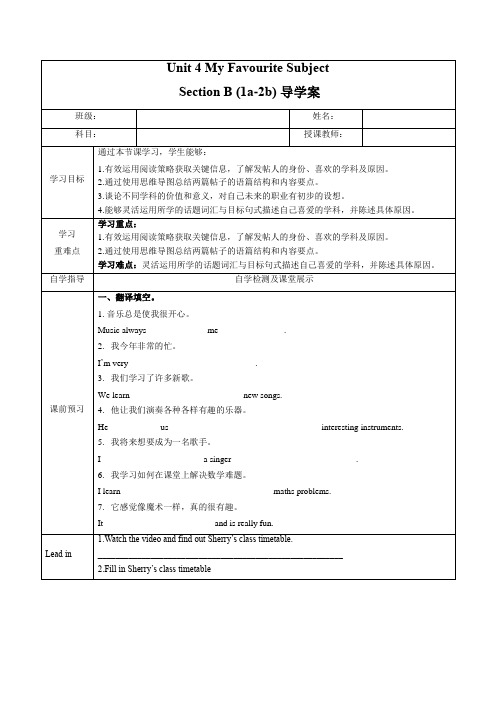
1.What’s your class timetable today? Write down the subjects.1.Let’s look at others’ information on the message board.①Where is the text from?____________________________________________________________②What’s the topic of the text?____________________________________________________________③What can you see on the message board?____________________________________________________________2.What can you predict from their usernames?____________________________________________________________3.1b Read the message board about the students’ favourite subjects. Underline all the school subjects each student has.____________________________________________________________________________________________________________________________________________________________________________________4.1c Read again and complete the table.5.Read again and answer the questions.① What subjects do Mike and Binbin both have?____________________________________________________________② How does Mike feel about music?____________________________________________________________③ What does Wu Binbin learn in his maths class?____________________________________________________________④Do you like music or maths? Why?____________________________________________________________6.Read again and complete the mind map.1.2a Discuss the following questions in groups and complete the mind map with your own2.2b Write a message using your information and post it on the board.3.Let’s thinkWhy do we have to learn so many subjects?What can you learn from different subjects ?____________________________________________________________一、用所给词的适当形式填空【参考答案】1.Watch the video and find out Sherry’s class timetable.2.Fill in Sherry’s class timetable1.What’s your class timetable today? Write down the subjects.1.Let’s look at others’ information on the message board.①Where is the text from?They are two posts(帖子)from the Internet.②What’s the topic of the text?Maybe they are about different subjects.③What can you see on the message board?There are two users.Mike Davis and Wu Binbin.2.What can you predict from their usernames?Maybe Mike’s favourite subject is music.Maybe Wu Binbin’s favourite subject is math.3.1b Read the message board about the students’ favourite subjects. Underline all the school subjects each student has.4.1c Read again and complete the table.5.Read again and answer the questions.① What subjects do Mike and Binbin both have?Maths,history,English,and IT.② How does Mike feel about music?Music always makes him happy.③ What does Wu Binbin learn in his maths class?He learns how to work out maths problems in class.④Do you like music or maths? Why?I (don’t) like music/maths because...6.Read again and complete the mind map.1.2a Discuss the following questions in groups and complete the mind map with your own。
人教版七年级英语下册Unit4 Don’t eat in class!导学案

七年级下册Unit4 Don’t eat in class!导学案Section A班级:姓名:时间:年月日【学习目标】1、掌握10个单词:rule arrive be on time hallway hall dining listen listen tofight sorry outside2、掌握并灵活运用句型:What are the rules ?Don’t do sth. We can(not) do sth We must do/be【学习重难点】1. 祈使句的肯定形式与否定形式2. 句型:What are the rules ? Don’t do sth.We can(not) do sth We must do/be)【预习指导】写出并读出下列单词和短语:1.校规2.迟到3.听音乐4.和他打架5.在走廊里6.在课堂上7.准时 8.在教室里预习课本p19,找出其中的短语和重要句型1 、不要在走廊里跑______________________2、不要上课迟到___________________________3、不要在教室里吃东西___________________4、不要在教室里或走廊里听音乐_____________5、不要打架______________6、你校的规则是什么?________________【合作探究】语法(祈使句)1.)含义:祈使句是用来表示请求、命令、叮嘱、号召或者劝告等的句子,这类句子的主语常是第二人称you,也就是听话者,因而you常省去2.)注意:祈使句的开头是动词原形。
如:过来!快起床!3.)祈使句的否定形式多以do not(常缩写成don't)开头,再加上动词原形。
如:别看电视!别打架!不要说话!学习成果展示一、根据汉语意思完成句子。
1、我们必须准时到校。
We ________ get to school ________ ________.2、不要在走廊上奔跑。
新人教版七年级英语下册第四单元导学案

新人教版七年级英语下册第四单元导学案【课题】Unit 4 Don’t eat in class【学习目标】:1.学习识记本单元中的重点词组及单词。
2.初步理解本单元中重点单词及词组的用法。
【要点和难点】理解掌握重点单词及词组的用法。
【导学指导】(一)自主学习写出并读出下列单词和短语:校规迟到听音乐重要的in the hallway Don’t fight. listen to music arrive late for class 外出______________ 清洗餐具____________ 铺床_______________(对某人)要求严格___________________ 遵守规则_____________________到达_________ 准时____________ 餐厅_________________(二). 合作探究1. arrivev. 到达。
是不及物动词,常用的短语为“arrive at +小地点”和“arrive in +点”;arrive 后如果加副词,at/ in 省略。
get to +地点指到达某地,to 后如果接副词,则to 省略。
reach 意为“到达”可直接跟宾语。
例1)I am always the first to ________ _________ the school.2) They usually ________the school at five o’clock.2. listen v. 听,倾听,指听的动作,为不及物动词,可以单独使用,但其后如接宾语则加介词tohear 表示听到,是指听得结果例2. __________! Can you ________ anything? 听!你能听到什么?3. fight v. n. 打架;战斗。
相关短语:fight about fight with fight againstfight about 意为“为…..而战”“就….争吵”该短语后接名词代词或宾语从句,表示吵架的原因。
新目标七年级英语Unit4 Where is my schoolbag导学案

上课时间:2013年月日班级:小组:姓名:单县实验中学初一英语学案Unit4 Where’s my schoolbag?主备萧东来审核初一英语组9/28/2013学习目标:1、学会课本98页的单词where---always2、学会本单元8个短语3、能够正确使用where 引导的特殊疑问句。
4、能够正确使用介词in, on, under描述物品所在的位置。
5、.掌握下列句型:Where‟s…?It…s on/under/in…Where are…?They‟re on /under/in…Is the backpack on the sofa?Yes, it is./ No, it isn‟t.Are …on /under/in…?Yes, they are ./No, they aren‟t.6、背诵21页Gramma Focus ,23页2b,70页的三个听力对话。
7、会写一篇英语短文,描述自己的房间。
学习过程:一、自主学习单词(98页)看汉语,说英语1、在哪里2、桌子3、床4、书架5、沙发6、椅子7、在……上8、在……下9、来10、快点儿11、书桌12、认为13、房间14、他们的15、帽子16、头17、是的18、知道19、收音机20、时钟21、磁带22、播放机23、录音机24、模型25、飞机26、飞机模型27、整洁的28、但是29、我们的30、到处31、总是二、自主学习短语看英语,说汉语1、in your schoolbag2、on the sofa3、under the chair4、come on5、I don‟t know6、in our room7、have a clock 8、in the bookcase看汉语,说英语1、在你的书包里2、在沙发上3、在椅子下4、快点5、我不知道6、在我们的房间里7、有一个闹钟8、在书橱里三、背诵默写4个重点句子1、——Where‟s the schoolbag ? 书包在哪里?——It‟s under the table .在桌子底下。
unit4导学案(5课时)人教版七年级下册英语unit4导学案(5课时)4-1

Unit4 第 1Step2 Presentation型新授号4-1(1) Learn the new words and phrases using some pictures.(2) Present key sentences with these pictures.学科英班七年字Don’ t arrive late for class.We must be on time.笔人使用人使用Don’ t run in the hallways.Don’ t eat in the classroom.1、初步掌握第 19 的生和句型;Don’ t listen to music in class.Don’ t fight.(3) Finish 1a, and then check the answers.2、初步认识祈使句;Step3 Listening学目3、校 ;Listen and finish 1b. Check the answers.4. 复 must 的用法Step4 Pair workTalk about the rules in 1a.学重初步认识祈使句点、点知研究安排1Don’ t arrive late for class.不要上到。
( 1)本句是一个否认的祈使句,祈使句是以原形开的,表自主翻示命令或求的句子。
其否认句是在原形以前加 don’t。
如:Don’ t do that again不.要再做那的事情了。
1. school rules ____________2. arrive late for class _______________3. (be) on time ____________4. in the hallways __________________Don’ t tell our teachers our secrets不.要告我老我的。
(2)必定的祈使句:5. 在餐 ______________6. 听音 ____________________展现沟通①句型:原形⋯...(省略主)。
- 1、下载文档前请自行甄别文档内容的完整性,平台不提供额外的编辑、内容补充、找答案等附加服务。
- 2、"仅部分预览"的文档,不可在线预览部分如存在完整性等问题,可反馈申请退款(可完整预览的文档不适用该条件!)。
- 3、如文档侵犯您的权益,请联系客服反馈,我们会尽快为您处理(人工客服工作时间:9:00-18:30)。
初中英语(Go for it)七年级下册第四单元导学案第四课时Section B(3a~Self Check)【学习目标】1. 复习情态动词can表示许可的用法;2. 复习练习运用祈使句以及情态动词have to及must来表达一些规则。
3. 谈论表达自己对规则的想法或看法。
4.通过对规章制度的复习,规范自己的行为,以便自己和他人更好地遵守规章制度,为形成良好的社会意识打下基础。
【课时重点】会运用情态动词can,can’t,have to,must来介绍自己家中的规定。
【预习导学】一、填一填阅读教材上的3a,用情态动词have to,must,can或can’t填空,完成3a。
二、选一选选词填空,完成教材上Self Check中的第一部分。
三、想一想1.本单元学到的句型中常用词汇有哪些?2.用以上词汇写句子,完成教材上self check 中的第二部分①②③④【合作探究】活动一: Presentation and practice.1. Present some new words on the big screen.hair, learn, keep + 名词+ 形容词2. Ss learn the new words and expressions.3. Review the how to use have to and must; can and can't.4. Review the letters.5.T: Zhao Pei has many rules at home and at school. She's unhappy, too. She wantssome help from Dr. Know. Read her letter below and fill in the blanks with have to /must, can /can't.6. 指导:首先,认真阅读整篇短文,理解短文的大意。
然后,认真阅读每个句子,理解作者对这些规则的看法;同时,推敲每个句子深处的意思,确定是用have to/must还是can/can't。
最后,应再通读一遍短文,看自己所填写的词组是否通顺正确。
7. Check the answers.活动二: Before Writing1. Let's work on 3b:We have many rules at home and at our school. Think what things you have to do and what things you can't do. Complete the chart with rules in your home and school. You can discuss with your partners in your group.2. Ss discuss their rules in groups. Then fill in the blanks. Then check the rules you think are unfair.For example: You must wear a school uniform at school. You must keep your hair short at school.3. Let some groups say their answers. Write some of the rules on the blackboard.4.想一想你在家里或学校里要遵守哪些规则,完成下面的表格,并在你认为不公平的规则旁边画上“×”。
活动三:While Writing1. Now write a letter to Dr Know. Tell her about all the rules and how you feel about them.Dear Dr.Know,Can you help me? I'm not happy because there are too many rules at my home.Every morning,I must get up at 60’clock.将信互相交换,你们也来做一回“万事通博士”,给你的同学回信,告诉他/她应该怎么做。
Dear ,I know you are not happy.But I think2. 写作指导:首先,可以再次阅读2b及3a中的短信的内容及格式。
其次,模仿这两封信的格式写好自己信件的格式;然后,根据刚才自己小组讨论的规则整理成一封文字通顺的信件。
并且,表达自己对这些规则的想法或看法。
之后,以礼貌的话语请求Dr. Know的帮助。
最后,再通读一遍自己的短信看语句是否通顺。
活动四:After Writing.1. Ss write the letter on the workbook. Exchange their workbook with their partner.2. Check the letters.3. Let some Ss read their letter to the class. Correct the mistakes in the letter.活动五:Self Check 1 and Self Check 21. Tell Ss they will read an interesting story about Timmy the Mouse. He's an funny mouse. Do you want to know what rules he has at home? Now read this short passage and fill in the blanks with the words in the box.2. Ss read the short passage and try to fill in the blanks with the words in the box.3. Tell Ss they should use "can/can't; have/must; don't have to" to write about the rules at school. Write two sentences for each rule.4. Ss work by themselves and write the rules on the workbook.提示句子结构:主语+ 情态动词+ 动词原形+ 其他5. Let some Ss read their answers aloud. Correct any mistakes they have.【知识超市】1. ●My grandpa is strict with me,but I think it’s best to follow the rules.我爷爷对我很严厉,但我认为最好还是遵守规则。
be strict with sb.意为“对某人要求严格”,而“对某事要求严格”则用be strict in sth.例如:My mother is strict with me and in my study.我妈妈对我以及我的学习要求严格。
[做一做]单项选择。
( )1.Parents are strict US and our study.A.with;in B.in;withC.for;on D.in;of( )2.Her mother is very strict her.A.at B.on C.in D.with2. 易错点辨析:情态动词have to与must( 1).have to意为“必须;不得不”,它侧重于客观上的必要和外界的权威。
结构:主语+have to+动词原形+其他。
例如:We have to wear sports shoes for P.E.class.在体育课上,我们必须穿运动鞋。
否定句:主语+don’t have to+动词原形+其他。
例如:Nick doesn’t have to wear a uniform.尼克不必穿制服。
疑问句:Do(Does或Did)+主语+have to+动词原形+其他。
例如:Do you have to stay at home on weekends?周末你必须待在家里吗? ’Yes,I do./No,I don’t.是的,我必须。
不,我不必。
(2).must意为“必须;应该”。
否定式must not(mustn’t)意为“不应该;不许可;不准;禁止”。
在回答带有must的问句时,否定回答常用need not(needn’t)或don’t have to,表示“不必”,而不用must not(mustn’t)。
例如:The work must be finished as soon as possible.这项工作必须尽快完成。
You mustn’t speak like that.你不能那样说话。
一Must I be home before eight o’clock?8点之前我必须回家吗?一Yes,you must./No,you needn’t./No,you don’t have to.是的,你必须。
/不,你不必。
(3).have to意为“必须;不得不”,在这个意义上与must很接近,但must 表示的是说话人的主观看法,而have to强调的是客观需要。
例如:I have to go now.我得走了。
(客观需要)I must go now.我必须走。
(主观看法)[做一做]单项选择。
()1.一you have to wear a hat today?一No,we don’t.A.Are B.Can C Do D.Did ()2.一Must I clean the blackboard?一No, you .A.needn’t B.mustn’t C.can’t D.may not 【拓展运用】Ⅰ. 根据语境及所给首字母提示,补全所缺单词。
1. —Your room is very d .—I know. I’ll clean it.2. Every weekend Jerry r books in the library.3. —How do you f about seeing your old friends?—Very happy.4. —I have an English test on Tuesday.—Good l to you.5. —I lost my pencil box.—That’s t .Ⅱ. 根据句意及括号内所给单词的提示填空。
